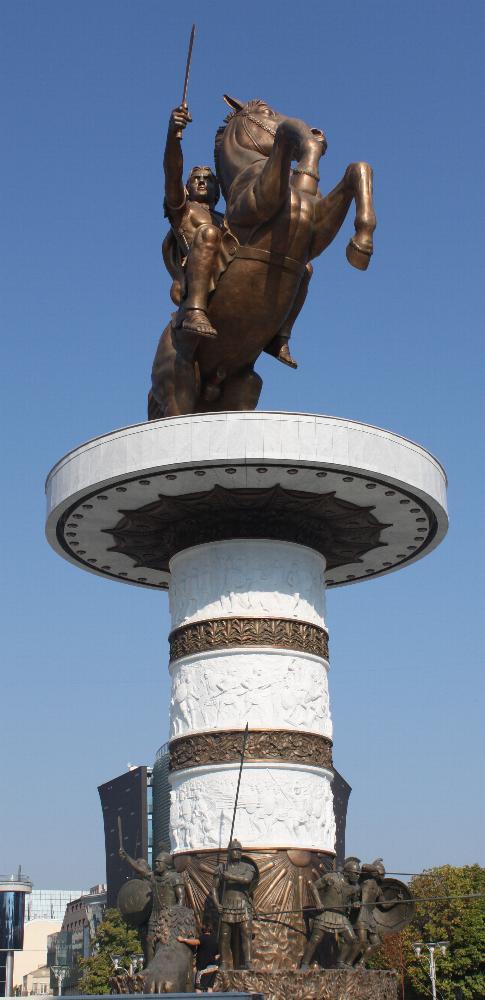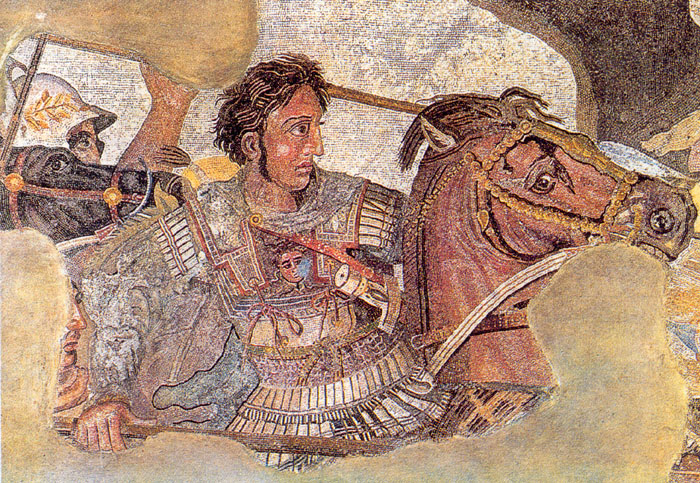In the Name of Macedonia
 Last June, the Republic of Macedonia put the final touches on a 72-foot tall bronze statue of Alexander the Great in Skopje, the country’s capital. The public monument was not the first in recent memory to take the conqueror’s name, following Skopje’s airport and the country’s main highway. To Greece, Macedonia’s neighbor to the south, the dedications have been seen as provocations – the latest in a conflict that has pitted the two countries for over 20 years.
Last June, the Republic of Macedonia put the final touches on a 72-foot tall bronze statue of Alexander the Great in Skopje, the country’s capital. The public monument was not the first in recent memory to take the conqueror’s name, following Skopje’s airport and the country’s main highway. To Greece, Macedonia’s neighbor to the south, the dedications have been seen as provocations – the latest in a conflict that has pitted the two countries for over 20 years.
Greece accuses the former Yugoslav province, which has been independent since 1991, of stealing its national heritage and misappropriating Hellenic heroes such as Philip and Alexander of Macedon for the purpose of tourism and national identity building. Stealing another country’s national heritage is a bad enough crime, say Greeks, but revising history is unacceptable.
The ancient state of Macedonia, a kingdom which lay to the northeast of the Greek peninsula, achieved everlasting fame when Alexander the Great, after brutally subduing and uniting Greece into a Pan-Hellenic alliance under the banner of “freedom of the Greeks,” took his armies into Asia and defeated the Persian Empire. He had created the widest empire the world had yet seen. In 323 BCE, Alexander’s death brought the collapse of his empire; however, it inaugurated the era commonly known as the “Hellenistic period,” an achievement perhaps even greater than the crafting of Alexander’s empire. Greek language, culture, arts, science and military techniques became the norm from Athens to India.
But Skopje, the modern capital of Macedonia, was situated in the land of the Paeonians, a Thracian people, and thus isolated from this Greek Golden Age. The ancient capital of Macedonia, Pella, is nowadays a village in the region of Macedonia, Greece. Alexander the Great subdued many countries, including Paeonia, but none of them had dared to call themselves Macedonia until 1991.
Modern Macedonia, a southern region of the former Yugoslavia adjacent to Greece’s own region of Macedonia (which more or less encompasses the vast majority of the ancient kingdom), declared its independence in 1991 and named itself the Republic of Macedonia. Its population is ethnically Slavic – another point of contention for modern Greeks. Ever since the country became independent the controversy has been ongoing: the first Macedonian flag, representing the Vergina Sun (which is also the official symbol of the Hellenic Parliament) was banned from both the United Nations and the Olympic Games under Greek pressure and was ultimately modified. Greece, a member of both the European Community and NATO, put intense pressure on international institutions that resulted in a United Nations-led decision in 1995: Greece would not prevent Macedonia from joining international organizations so long as it adopted the temporary title of “Former Yugoslav Republic of Macedonia” (FYROM).
Though the dispute appeared to have been resolved, it could not, in light of Greece’s financial crisis and Macedonia’s continuing poverty, have become more intense. The increasing animosity has to do with the nationalist aspect of the controversy, which has been further emphasized by the delicate state of both countries’ economies. Greece complains that more than 60 percent of the UN’s members (including the United States) still address Macedonia by its constitutional name, Republic of Macedonia, and Macedonia remains frustrated that its aspirations to join both the EU and NATO have been blocked by the ongoing dispute. In response, Macedonia has instituted a policy of “Antiquisation” since 2005 – an expensive identity-building program that includes the erection of statues of Alexander the Great and Philip II all around the country. It has also been fabricating maps for classrooms that show a “greater ancient Macedonia” which includes modern Macedonia, thus lying to its own population.
This controversy, in the face of the economic crisis hitting Greece and the increasing ethnic tension in Macedonia between Albanians and Macedonians, seems quite silly. However, in the broader scheme of history, Macedonia’s attempts to usurp another region’s culture are simply inadmissible. In a letter to President Obama, an association of Greco-Roman antiquity scholars urged him to repair the damage of recognizing the “Republic of Macedonia.” They call the label an “abrogated geographic and historic fact, but it also has unleashed a dangerous epidemic of historical revisionism, which the most obvious symptom is the misappropriation by the government in Skopje of the most famous of Macedonians, Alexander the Great.” Skopje’s effort to trick its own citizens with incorrect maps, historical revisionism and pseudo-nationalistic discourse is the real crime of the whole controversy.


